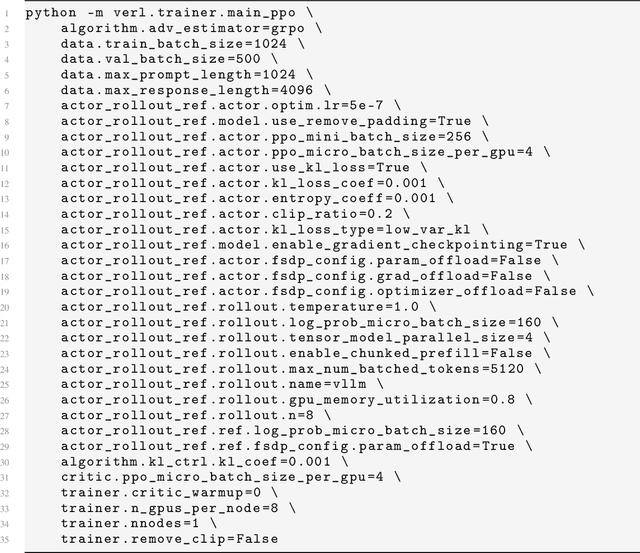Deyang Kong
OPE: Overcoming Information Saturation in Parallel Thinking via Outline-Guided Path Exploration
Feb 09, 2026Abstract:Parallel thinking has emerged as a new paradigm for large reasoning models (LRMs) in tackling complex problems. Recent methods leverage Reinforcement Learning (RL) to enhance parallel thinking, aiming to address the limitations in computational resources and effectiveness encountered with supervised fine-tuning. However, most existing studies primarily focus on optimizing the aggregation phase, with limited attention to the path exploration stage. In this paper, we theoretically analyze the optimization of parallel thinking under the Reinforcement Learning with Verifiable Rewards (RLVR) setting, and identify that the mutual information bottleneck among exploration paths fundamentally restricts overall performance. To address this, we propose Outline-Guided Path Exploration (OPE), which explicitly partitions the solution space by generating diverse reasoning outlines prior to parallel path reasoning, thereby reducing information redundancy and improving the diversity of information captured across exploration paths. We implement OPE with an iterative RL strategy that optimizes outline planning and outline-guided reasoning independently. Extensive experiments across multiple challenging mathematical benchmarks demonstrate that OPE effectively improves reasoning performance in different aggregation strategies, enabling LRMs to more reliably discover correct solutions.
Autoformalizer with Tool Feedback
Oct 08, 2025



Abstract:Autoformalization addresses the scarcity of data for Automated Theorem Proving (ATP) by translating mathematical problems from natural language into formal statements. Efforts in recent work shift from directly prompting large language models to training an end-to-end formalizer model from scratch, achieving remarkable advancements. However, existing formalizer still struggles to consistently generate valid statements that meet syntactic validity and semantic consistency. To address this issue, we propose the Autoformalizer with Tool Feedback (ATF), a novel approach that incorporates syntactic and consistency information as tools into the formalization process. By integrating Lean 4 compilers for syntax corrections and employing a multi-LLMs-as-judge approach for consistency validation, the model is able to adaptively refine generated statements according to the tool feedback, enhancing both syntactic validity and semantic consistency. The training of ATF involves a cold-start phase on synthetic tool-calling data, an expert iteration phase to improve formalization capabilities, and Direct Preference Optimization to alleviate ineffective revisions. Experimental results show that ATF markedly outperforms a range of baseline formalizer models, with its superior performance further validated by human evaluations. Subsequent analysis reveals that ATF demonstrates excellent inference scaling properties. Moreover, we open-source Numina-ATF, a dataset containing 750K synthetic formal statements to facilitate advancements in autoformalization and ATP research.
Rethinking the Sampling Criteria in Reinforcement Learning for LLM Reasoning: A Competence-Difficulty Alignment Perspective
May 23, 2025



Abstract:Reinforcement learning exhibits potential in enhancing the reasoning abilities of large language models, yet it is hard to scale for the low sample efficiency during the rollout phase. Existing methods attempt to improve efficiency by scheduling problems based on problem difficulties. However, these approaches suffer from unstable and biased estimations of problem difficulty and fail to capture the alignment between model competence and problem difficulty in RL training, leading to suboptimal results. To tackle these limitations, this paper introduces \textbf{C}ompetence-\textbf{D}ifficulty \textbf{A}lignment \textbf{S}ampling (\textbf{CDAS}), which enables accurate and stable estimation of problem difficulties by aggregating historical performance discrepancies of problems. Then the model competence is quantified to adaptively select problems whose difficulty is in alignment with the model's current competence using a fixed-point system. Experimental results across a range of challenging mathematical benchmarks show that CDAS achieves great improvements in both accuracy and efficiency. CDAS attains the highest average accuracy against baselines and exhibits significant speed advantages compared to Dynamic Sampling, a competitive strategy in DAPO, which is \textbf{2.33} times slower than CDAS.
SampleMix: A Sample-wise Pre-training Data Mixing Strategey by Coordinating Data Quality and Diversity
Mar 03, 2025Abstract:Existing pretraining data mixing methods for large language models (LLMs) typically follow a domain-wise methodology, a top-down process that first determines domain weights and then performs uniform data sampling across each domain. However, these approaches neglect significant inter-domain overlaps and commonalities, failing to control the global diversity of the constructed training dataset. Further, uniform sampling within domains ignores fine-grained sample-specific features, potentially leading to suboptimal data distribution. To address these shortcomings, we propose a novel sample-wise data mixture approach based on a bottom-up paradigm. This method performs global cross-domain sampling by systematically evaluating the quality and diversity of each sample, thereby dynamically determining the optimal domain distribution. Comprehensive experiments across multiple downstream tasks and perplexity assessments demonstrate that SampleMix surpasses existing domain-based methods. Meanwhile, SampleMix requires 1.4x to 2.1x training steps to achieves the baselines' performance, highlighting the substantial potential of SampleMix to optimize pre-training data.
 Add to Chrome
Add to Chrome Add to Firefox
Add to Firefox Add to Edge
Add to Edge